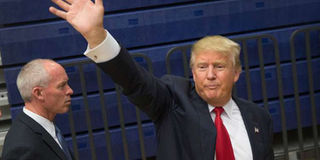Why today’s elections make fools of journalists, pollsters

Republican presidential candidate Donald Trump waves to supporters as he leaves a rally on January 26, 2016 in Marshalltown, Iowa. Republican presidential candidate Ted Cruz beat Donald Trump in the Iowa caucus on February 2, 2016. PHOTO | AFP
What you need to know:
In the first preliminary nomination contest in Iowa, Donald Trump was beaten to second by congressman and Christian fundamentalist Ted Cruz
Opinion polls, which capture a snapshot of the moment about how people are likely to vote, become imbued with a predicative power they don’t have.
In Kenya, in both 2007 and 2013, the results didn’t align perfectly with the opinion polls.
After the novelty and, admittedly, historic victory of Barack Obama in the 2008 US election, it seemed it would be a while before an American poll attracted as much interest in Africa.
We didn’t have a tribal stake in this race. Yes, in the latest one, Democratic Party aspirant Hillary Clinton has a shot at winning in November, but then Africa elected a female president to office long ago.
Then along came a brash, foul-mouthed, seemingly unhinged billionaire and reality TV host Donald Trump.
His views on immigrants, Muslims, and the rest of the world are so crazy, most people laughed him off as a clown who would fade quickly.
He didn’t. He grabbed the lead in the opinion polls, and very soon the media had no room for anyone else, and the rest of the world panicked about the prospect of a deranged narcissist being in charge of the world’s most dangerous arsenal.
On Monday, Trump landed hard. In the first preliminary nomination contest in Iowa, he was beaten to second by congressman and Christian fundamentalist Ted Cruz. He survived only just from being knocked into third.
And now folks are trying to explain how, again, the pollsters who had Trump winning big got it so wrong.
In the last British election, pollsters gave David Cameroon dim prospects. In the end, he blew rivals away to take a resounding victory.
In Kenya, in both 2007 and 2013, the results didn’t align perfectly with the opinion polls.
The explanation was that, in Africa, there would always be differences between what opinion polls say and the election results, because we are notorious vote thieves.
Whatever the truth, one senses a striking similarity between how the American and African media cover elections these days.
To keep a cynical public interested, we overdramatise and talk up heated contests that are often not there. Elections become like sport, with an upset scenario built in.
And since there is an upset, there has to be an underdog, a David that shall slay Goliath.
Opinion polls, which capture a snapshot of the moment about how people are likely to vote, become imbued with a predicative power they don’t have.
Small shifts, even ones introduced by statisticians with shaky hands or a hangover when they are doing the numbers, assume the gravity of a seismic shift.
MODERN POLLING METHODS
That said, I still totally love opinion polls, if they are done by someone who is clever and invests the time to make them good.
The problem, therefore, seems to be that modern polling methods have been made nearly obsolete by social changes and technology.
In the past, most voters used to form their electoral choices based on influence of the family, their ethnic community, sometimes material interests, and mainstream media.
In Africa, the voters in the countryside didn’t have media, so they did what the chief and the relatives from the towns and cities told them.
It seems the mobile phone and internet have changed all that — and in very interesting ways. Previously, you could, for example, predict how tribal politics played out.
There were “elders” who were trusted to give direction on which candidate held the best interest of the tribe.
Now, even if digital technology has not ended tribal politics, it has undermined the authority of the elders and clan leaders.
Now some obnoxious fellow who would never have been allowed to even serve elders tea, can set the tone on his blog, or on social media.
So while some people might still vote along ethnic lines, the tribal politician they will choose is different.
And while the mother and father might set the tone about how the family should vote at the dinner table, fellows will disperse and go to their WhatsApp, Facebook and Snapchat groups where some subversive character is pushing a different — and more appealing — line.
Because pollsters and journalists don’t have access to these places, we don’t have a good picture about how they are working and impacting voting intentions and behaviour.
They are, therefore, turning our previously solid analyses and fairly good trend pointers into nothing more than voodoo jabber.
We are not hopeless at our jobs. We just got left by the train at the station.
The author is editor of Mail & Guardian Africa. Twitter@cobbo3.





